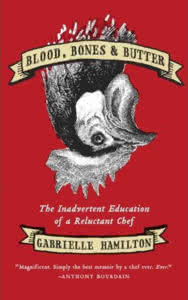BLOOD, BONES AND BUTTER: THE INADVERTENT EDUCATION OF A RELUCTANT CHEF (2011)

One could reasonably assume from the title, “Blood, Bones & Butter: The Inadvertent Education of a Reluctant Chef”, that Gabrielle Hamilton’s best-selling memoir is about food.
The fact that Hamilton is the owner and chef of the chic and fabulous East Village restaurant Prune further implies that readers can expect a food-focused literary journey through what it takes to genuinely distinguish oneself in the restaurant world. To this end, the book will not disappoint.
Hamilton writes gorgeously of her training in France at a classic creperie: “I fixated on the local shops…the boulangerie, poissonnerie, boucherie, fromagerie, and patisserie – and how they displayed their foods in that careful, precise and focused way that never, in spite of all that precision and care, looked rigid or antiseptic or strained. Every piece of food in every store – no matter how artful, precise, and often jewel-like – begged to be touched, smelled and heartily eaten.”
Her description of what it takes to open a decent restaurant is hilarious. She makes the basic yet compelling connection between her culinary success with her significant financial struggles, explaining: “I starved…I came to know every contour of my hunger in precise detail. When I came to be actually holding the keys to my new restaurant, wondering what credentials I possibly possessed for owning and operating such a place, I counted knowing hunger and appetite as one of them.”
Readers will absorb through Hamilton’s artful language how to master or at least improve an omelet. It is likely that all future egg preparation will call Hamilton to mind with a smile.
And yet, it is not the culinary dimensions of this book that give it tremendous depth. What distinguishes this remarkable memoir is Hamilton’s understanding of how our past affects us in both good ways and bad. She portrays how, if one learns to embrace the good from one’s past and work through the bad, a happier life is possible.
Hamilton’s childhood neglect caused considerable pain, and yet her mother gave her an understanding of good food and her father instilled a sense of what it means to entertain. She internalizes and embraces these strengths and transforms them into something beautiful.
Hamilton also understands and writes movingly of the power of immersing oneself in the work rather than over-focusing on the end game or a master plan. During her reluctant participation in a culinary conference titled “Where are the Women?”Hamilton explains, “I was not interested in answering [this] tired question…Get in the kitchen; cook well; and the rest will take care of itself.”
Note to readers: Don’t be surprised if reading “Blood, Bones and Butter” inspires a trip to New York to visit Prune. Hamilton is often available to sign your book with a radiant, welcoming smile.
